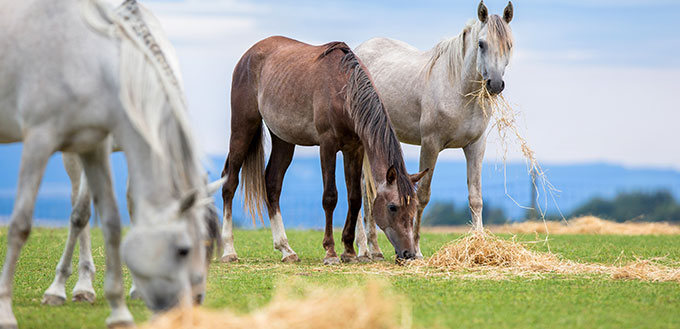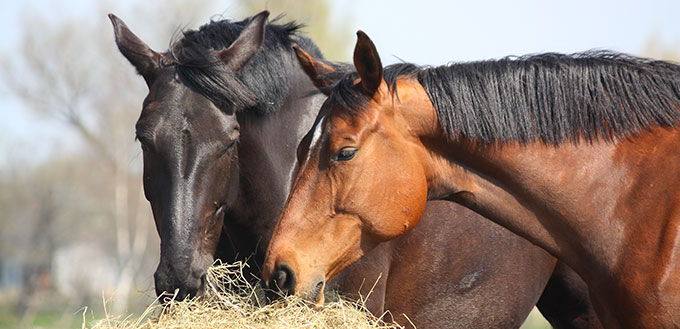As herbivores, horses need to forage and feed throughout the day to keep themselves nourished and their digestive system working as it should. And this means they need a carefully managed diet to support their health, whether they live out all year, or are stabled.
The best diet for domestic horses is one that mimics what they would eat in the wild, supplemented to ensure they get the right balance of nutrients, vitamins, and minerals.
We take a look inside the world of the equine to discover exactly what horses eat, and why.
The Equine Digestion
As herbivores, the horse’s digestive system is very different to ours. Evolved to thrive on a high fiber/low protein diet, a horse’s digestive tract is long and stomach small, so they need to be ‘trickle fed’ their fiber diet in small amounts over long periods of time. Horses also get most of the energy they need from the fiber they eat. And this means the horse – whether domesticated or the wild horses out on the plain – needs to graze throughout the day in what is known as foraging, whether that’s pasture or supplied hay.
Horses spend most of their waking day eating, but it should be based on a little and often approach to nutrition. In the wild, horses will travel many miles throughout the day as they forage for food. Our domestic horses are not so lucky and can’t roam the way they naturally would get the foraged fiber they need. Which is why their human needs to ensure they have access to the right diet to keep their digestion happily on the move.
Too little fiber and your horse can suffer from conditions including gastric ulcers and colic, as well as lose condition and weight.

Forage First
Forage is the first and foremost food to feed your horse as it keeps their digestion ticking over as it should. The natural food for both domestic and wild horses is pasture grass, which contains most of the nutrition they need for good health as well as silica which they need for healthy teeth.
However, tender grass pasture, particular during the spring and early summer can actually be too rich for domesticated horses as they contain sugar, which can cause health conditions such as laminitis (inflammation of the internal tissues in the hoof) as well as obesity. Particularly if your horse is an over-eater or prone to weight gain, access to lush pasture should be restricted.
To compensate for poor pasture or the need to restrict your horse’s diet, hay or haylage has become the go-to forage feed for horses, year-round. Hay is dried grass, while haylage is the grass that has been dried earlier in the season and retains more of the sweetness than horse hay, so choosing the best type of hay depends on your horse and any weight management or health considerations.
When it comes to quantities to feed your horse throughout the day, as a rough guide, they should be eating 1-2% of their body weight in forage every day. Both hay and haylage come in convenient bales for easy feeding and storage.
Supplementing Their Diet
When it comes to the horse diet, you will then need to add extra food as well as supplements, depending on their additional nutritional requirements. For example, horses that are in work or nursing mares will need extra energy and nutritional support, whereas horses with health conditions will need a more tailored and health-appropriate diet.
The extra food that can be added to a horse’s main forage diet include:
Grains
While not a natural food for a horse, adding grains to their diet can ensure they get the right balance of nutrition as well as extra fiber. The nearest wild horses would come to eating grains is the seed head found on grasses and so oats are most traditional grain used to feed horses.
However, some grains such as wheat are not actually beneficial to their diet or well being. What is important when adding grains to a horse’s diet is to ensure it doesn’t replace their natural foraging and are portion-controlled to avoid any potential health or weight complications.
Concentrates
When it comes to what do horses eat other than forage, concentrates are a tailored mixture of grains and other horse-safe foods such as flaxseed, beet pulp and bran, with added ingredients, depending on your horse’s additional nutritional needs. Molasses, for example, can be added to a feeding plan for energy, as can barley and corn. Concentrates will also include added vitamins and minerals to ensure a good nutritional balance for your particular horse in their regular feeding schedule.
When using concentrates, they should be mixed correctly and fed in appropriate quantities and not be used as a replacement for the essential forage your horse needs, but to supplement when needed, their breakfast and/or dinner .
Supplements
To ensure your horse is getting all the essential minerals in their daily meals, you can also choose to add a supplement, either in their concentrate mix or separately. Salt and mineral blocks, in particular, can be a horse’s favorite and can be added in a separate container, either in their stable or out in the paddock. A salt lick also gives your horse something to do, and are particularly beneficial during the warmer summer months, when they may experience mineral imbalances due to loss through their sweat.
Water
To support your horse’s digestion and the smooth the passage of their hay, forage and supplement food, constant access to plenty of fresh, clean water is essential. Without sufficient hydration, all that fiber can get blocked in the digestive tract and cause a potential impaction, which can have serious health implications for your horse. A good water intake is also essential for a host of other equine physiological processes as it makes up 65% of the body mass of an adult horse.
The average horse will drink a minimum of 5-15 gallons of water a day, more in the summer, and so a self-filling water trough in his stable and in his pasture is a good idea.
Treats
While not essential to your horse’s diet, it’s possible to feed them treats, as long as they are the right ones, and not too often.
Safe titbits for horses include carrots and apples as well as beetroot, cucumber, turnips and swede. Just ensure they are not whole but cut into bite-sized pieces that can’t get stuck in their gullet and your horse is not given too much. And be wary of feeding a horse any sugary treats such as mints or sugar cubes, which are also full of unnecessary calories.
If you don’t own a horse, it’s always good etiquette to ask the owner before feeding treats to any horse and never feed horses you come across in a pasture as you won’t know whether they are on a restricted diet due to health issues.

How Much a Horse Should Eat
The amount a horse should eat depends on their age, size, breed type, health and activity levels, as well as whether they are in foal or nursing. But as a guide, the average adult horse should be eating at least 15g of dry hay and forage per 1kg of bodyweight per day – that’s between 1.5-3% of the animal’s bodyweight or up to a bale of hay. Additional daily feeds of grains or concentrates should be kept small, no more than 2kg for an adult horse, less for ponies.
As well as access to their forage throughout the day, their additional feed should be in small portion meals and not served in one sitting, as this day-long feeding and grazing is the healthiest option for their digestive system and well being.
Types of Food a Horse Shouldn’t Eat
When exploring what horses eat, it’s equally important to know what not to feed horses, due to their sensitive gut, and predisposition to digestive disorders. Below are the main things you should never feed a horse:
- Too many sugary fruits and treats: These can cause colic, obesity and painful laminitis
- Human food: Processed foods such as chocolates and biscuits, bread, cake and meat are all harmful and a definite no-no for horses
- Certain vegetables: The cabbage family (including kale, broccoli, and sprouts) can cause excess gas and discomfort, while the Nightshade family, such as potatoes and tomatoes can be a poison risk
- Garden waste: It may sound counterintuitive, but never feed a horse your garden lawn clippings as the fresh, sweet grass can be too rich and they will eat too much
- Moldy, dusty hay: Throw such hay out, as the spores and dust can harm your horse’s lungs
- Orchard plants and weeds: Certain plants such as bracken fern, hemlock, red maple leaves and yew are toxic for horses so always avoid any plants when feeding your horse, to be safe
FAQs:
Q: What can horses eat list?
A: As we have seen, there is a pretty limited list of foods horses should eat, with pasture, hay, and haylage at the top of the best types of horse food list. Oats, bran, alfalfa, beet pulp, and flaxseed are all good supplementary feeds, as are salt licks and the occasional fruit or vegetable treat. If you are in any doubt what you should feed your horse or what to feed horses with ulcers, laminitis or other horse health-related conditions, speak to your vet or equine nutritionist.
Q: What do horses like to eat the most?
A: It does depend on your horse and their ‘greedy’ levels, but horses will gravitate towards their natural diet, with grass and hay their favorite foods. They also love their treats, with apples and carrots the traditional go-to, but it is important that horsey treats should only be fed in moderation.
Q: What do domestic and wild horses naturally eat?
A: Both wild and domestic horses are grazers and need to feed little and often. Their natural diet is grass and forage, which will have the high-fiber content their digestive system needs. Edible plants, shrubs, seed heads and fresh water will then supplement a horse’s natural diet in the wild.
Q: Can horses eat themselves to death?
A: Designed to constantly graze during their waking hours, most horses will keep eating if the food is provided for them and this can be a problem, if not managed with care. While they may not directly eat themselves to death, over-eating can lead to conditions which can be harmful, even fatal. Obesity and laminitis are likely outcomes of prolonged over-eating while colic – which involves their digestive tract which can become inflamed and even blocked – can be fatal if not caught and treated in time.
Sources:
- What Type Of Grass Do Horses Eat?, HowStuffWorks
- What Do Horses Eat?, SPANA
- The Rules Of Feeding Your Horse, The Humane Society
Note: The advice provided in this post is intended for informational purposes and does not constitute medical advice regarding pets. For an accurate diagnosis of your pet's condition, please make an appointment with your vet.







